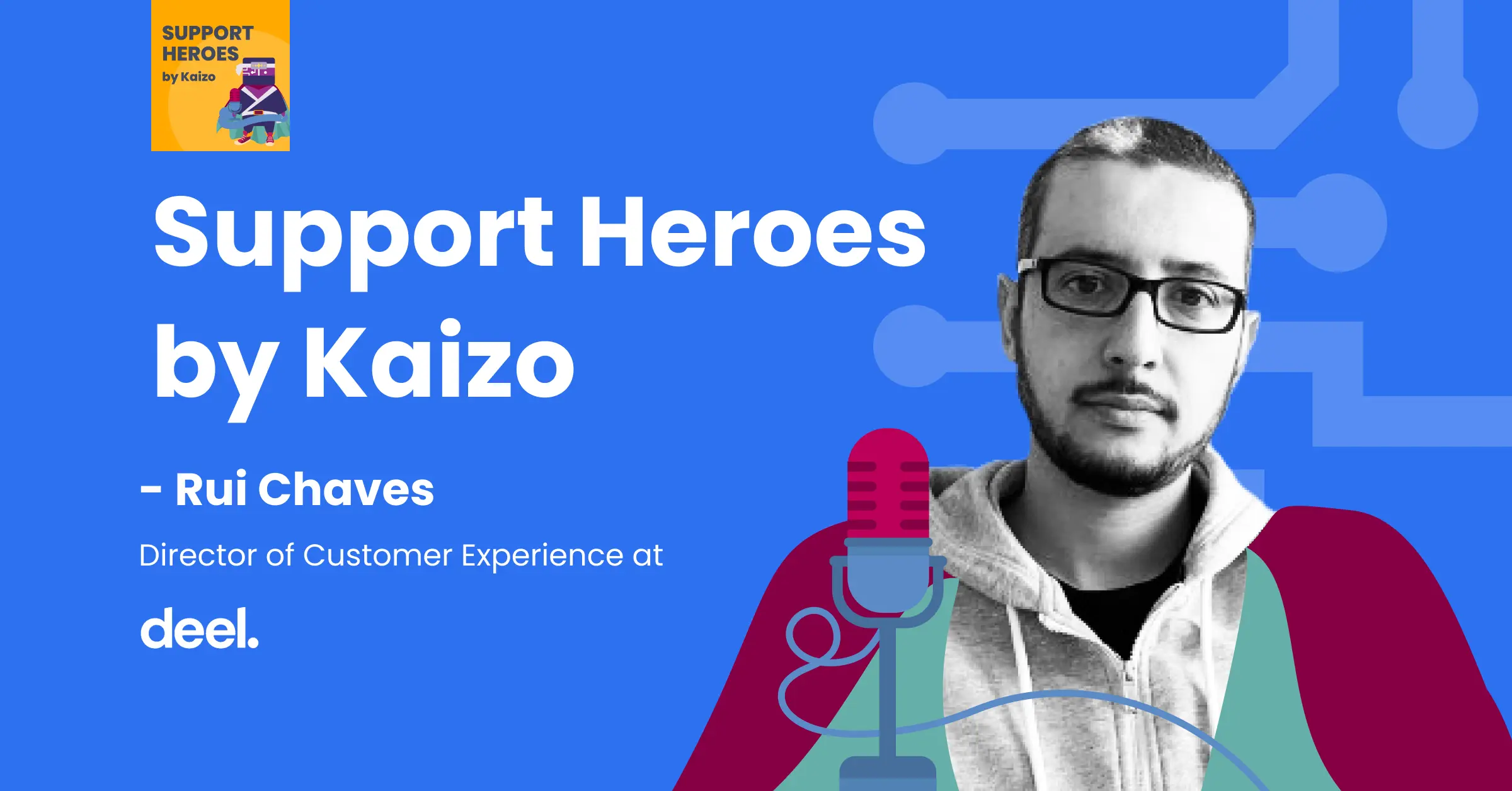Click ‘subscribe’ in the bottom right of the player to listen or download from Apple Podcast, Spotify, Google Podcast, and Amazon Music.
The twenty-seventh episode of Support Heroes by Kaizo featured Rui Chaves- Director of Customer Experience at Deel, who formally worked at Facebook, Uber and Dashlane.
In this episode, Rui provides an in-depth look at customer service outsourcing. Having started his career in an outsourcing firm and established multiple outsourcing programs at Facebook, Rui is the perfect person to separate the myths about outsourcing from the facts. Rui also shares his insights on why to outsource and how to get the most out of an outsourcing relationship.
Why do companies outsource customer service?
- Customer service outsourcing providers have a ‘comparative advantage’ in customer support operations. Meaning they specialize in hiring, training and maintaining customer service teams. Therefore, doing so more efficiently than those who don’t specialize in this field.
- Being able to rapidly scale an operation is useful for large and small companies alike. Smaller companies without customer service expertise can easily access that expertise through an outsourcer. Large companies, like Facebook, benefit from increasing and decreasing the number of agents in a short timeframe, especially by working with multiple outsourcers.
“[At Facebook] One: the speed that we could scale with an outsourcing provider. Two: the language requirements. We couldn’t scale European languages fast enough because Facebook was exploding around the world.”
- The other common reason is cost. Having in-house support requires hiring costs, extra office space, onboarding and training costs all in addition to a basic salary. In some instances, it is not beneficial for a company to incur these costs. Moreover, if a company incurs these costs, there’s no guarantee the support will be better than if they went with an outsourcing provider.
- Finally, customers don’t really care if their issue is being solved by an in-house or outsourced customer support person. All they care about is having their issues resolved.
How to outsource customer service the right way
- First, find the model that works for you. The two main routes are hiring support staff through a contractor and having them work in-house or working with an outsourcing provider.
- Hiring through a contractor allows you to hire high-quality in-house support staff very fast without the need for expertise in hiring for support. Working with an outsourcing provider has the same benefit but without the team being in-house/on-site.
- Regardless of which model is best, there are a few things that will increase success. First, making outsourced or contracted staff feel like full employees.
“We [at Facebook] didn’t see an outsourcing provider as a different team. Yes, they were on a different payroll but they were still part of community operations at Facebook and this was critical to having a highly engaged [outsorucing] team.”
- Second, enable outsourcing providers, invest in them and take their feedback to improve processes. Outsourcing customer service is like any other business relationship- you get out what you put in. Give agents, team leads and operations managers credit, invest money into their workspaces and be receptive to their input.
- Third, choose the right outsourcing firm and pay special attention to those working on the frontline; more so than directors and salespeople. This was some of the most valuable advice Rui received with regard to working with outsourcers.
“You need to spend the time with the agents, team leads and operations managers because they will tell you how bad your tools are (the tools you give them). They will tell you if your processes make no sense. They will tell you if the BPO is not treating them well.”
Is a call center job hard? Why be a call center agent?
“I think the notion of service, not just in the call centre industry, has evolved a lot. People now understand that it’s a fine industry to work in: you can make a career, earn good money and be happy.”
- In the fifteen years since Rui worked in customer service call centers, conditions have improved a lot. Rui noted that in the past, conditions were worse but that in most cases, were not as bad as the myths said. “I came from there. I really enjoyed it and I learned a lot”.
- As with any employer, there’s a spectrum ranging from those who take very good care of their employees to those who do not. Rui suggests that the negative perception of call centers started when customer service was valued less in the market and was less pervasive. Now, he believes this bad reputation is more of a myth than a fact.
- Rui also has no negative perception of people that worked in outsourcing companies. In fact, some of our star guests: Benedikt Dormann and Mara Vicente started their career working for outsourcing providers. At the right outsourcer, you can learn some of the best customer support skills around.


